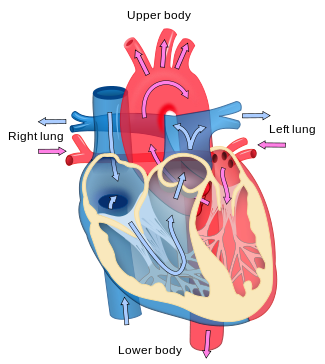Stress and life style
Everything now points to the kind of person you are including the ailments that may afflict you ! Does that surprise anyone given the kind of stressful life we are leading nowadays? According to health experts there is no question about it : your state of mind affects your heart. According to them Every day the evidence becomes more compelling, letting go of negative feelings like stress, anger and depression helps your body, while holding on to them hurts it and becomes the cause of major ailments like heart disease !
Before I go any further I would like to add a Cardiostat here - Patients who stay calm during the first 48 hours after a heart attack are far less likely to develop serious complications!!

Can your personality kill you ?
Many doctors after extensive research have detailed the following factors as having the greatest influence in the mind - heart connection. I am listing them down one by one..
1. Being Bitter and brooding all the time
This is a very negative feeling that can be a downer. The more you tend to brood over things and become bitter within yourself the more likely you are to get affected by heart ailments. And during the recovery period after a heart if you are going to do the same ( that is brood and be more bitter) you may be up to 84% more likely to die over the next 5 -10 years, probably from another heart attack.
People diagnosed with depression even 10 or 12 years back were four times more likely to suffer from a heart attack as those who weren’t depressed. These clearly show the relationship between our moods , temperaments and our heart health. And what is more, some studies also suggest that you don’t actually have to be clinically depressed to be at risk, having some symptoms of depression is very likely to boost the likelihood of heart attacks.
Several factors underlie the connection between the two. Depressed people tend to have more rapid heart rates, higher levels of stress hormones and heart rhythms that don't adjust well to fluctuations or changes in physical activities. Compared with non depressed , normal people the highly depressed and stressed out people are far more likely to pick up unhealthy habits like smoking and consuming liquor in excess rather than eat a healthy diet and do regular exercise..
Depression also becomes the cause of a feeling of hopelessness in people who become insomniacs. Such people are likely to be perpetually questioning themselves, Will I be able to make it? Is life worth living? Why do such things happen only to me ? - In fact they see problems everywhere and only dark tunnels with absolutely no light at the end and it only makes them become dejected in life .It does make a difference where your heart is concerned by adding that much more stress. Clinically, doctors have found out that build up of artery clogging plaque progressed fastest in those who were severely depressed all the time for one reason or the other!
2. Worrying all the time
We some people moving around with a constant frown on their face, worrying over every little thing, even though some of them are trivial matters that have ready solutions and can be solved or sorted out without all that excessive brain work and frowns !
No doubt that we all worry to a certain extent which is normal. But when it gets beyond a point, it becomes out of the ordinary. We worry about the increasing price in commodities or whether we will be able to meet all the financial demands before the end of the month and so on. But if you worry all your waking hours without trying to look for solutions, you are going to worry yourself to death ! Acute stress and anxiety sets of a rush of adrenaline and other hormones that cause the heart to beat much faster and blood pressure to surge, while signaling cells to dump fat into the bloodstream for quick energy and the cycle goes on..
Such repeated blood pressure surges can damage the lining of our artery which can lead to a blockage of artery . Fat in the bloodstream that does not get burned by muscles gets converted into cholesterol and can end up as plaque in the coronary arteries ( blood vessels that pump blood into the heart).Again like with people who are bitter and brooding – being anxious over your own prospects over survival after a heart attack wont do much good either.
3. Being short tempered and an anger addict
How many times have we not seen people losing their balance when they are angry, they scream, rant sometimes even giving vent to physical abuse and often are not even aware of what they have done. Anger is no doubt there in everyone. It is our body and mind’s normal response when we are either frustrated or threatened. Along with all the above mentioned reactions that most people have when they are angry ,one also breathes harder, heart beats faster, blood pressure rises, pupils dilate, blood sugar levels go up erratically and so...The brain send out a message to our body to pump out more adrenaline which in turn kick starts fatty acids from the body’s fat deposits, which in turn narrows the arteries and leave you gasping for oxygen!. Just one short moment of anger and look at how many changes take place within our body throwing everything off gear!
All of the above mentioned actions within our body pave the way for a heart attack , more so when such things tend to happen regularly! People don’t realise that Anger is a very powerful poison – a stew that has a potent combination of cynicism and hostility, which are all negative emotions that do not help our system. But at the same time researchers are also of the opinion that once in a way it is better to blow your top rather than remain bottled up. Harboring anger not only strains the heart but can also effect the bloods clotting ability, constrict arteries and slow down blood flow to the organs.
Researchers have found that anger and over anxiety can cause the hearts rhythms to become desynchronized , increasing the risk of arrhythmia ( which in its most dangerous form can prevent the heart from pumping enough blood to the brain and other vital organs. Another negative effect is that a person who is perpetually pissed off with something or the other is more likely to seek solace in smoking and alcohol.

4. Losing control or stifling one’s feelings Both are equally bad
some lose control over themselves unnecessarily whenever there is any kind of stress , be it regarding their job or some tension within their marriage or an argument or misunderstanding with a neighbor or a friend .This causes a chain reaction of many negative emotions which play a major role in how we respond to stress, which in turn has a direct impact on your heart.
On the other hand there are people who go into a shell and keep all their feelings within themselves. According to studies most of the emotions that contribute to heart disease can be buffered by interactions with other people. Social support could be had by opening out to a confidante, who could be anyone close like a friend, parents, even spouse, sister, brother or any family member for that matter. Women find that pouring out their heart is an easier thing to do than men, which is probably why their organ is stronger than their tight lipped counterparts.
Researchers say that even superficial chatting and exchanging ideas and talking about problems helps. The more communication you have with people the better for your heart and the less contact you have the worse is your heart disease prognosis.
5. Being a type D person
Here I would like to quote an example – Mr J is 45, a teetotaler, never smokes or touched alcohol in his life time, a strict vegetarian and takes all medications prescribed by his family doctor, has a relatively non stress job in a packaging business as a supervisor. He is definitely not a classic type of short tempered, competitive, aggressive ambitious workaholic types who normally are the prime candidates for a heart attack.
But the problem was something else with MR J, he dint like many things about his wife, like for example he hated her expensive taste, her carelessness and detested her housewifely skills. When he found that he could do precious little to change her attitude, he began by threatening to die of a heart attack since things were unbearable to him. In fact when he was 42 he had a mild heart attack and later had high blood pressure and diabetes and also went on gloomily predicting that his wife’s attitude and behavior would kill him one day since his heart wouldn’t take things any more. He finally succumbed to a heart attack when he was 45. Now heart specialists name such cases as Mr J as being type D.
A typical type D is a non appealing person who never smiles, whose brow is perpetually creased with anxiety and forever grumbling about something or the other .Such people are also insecure about their job although they may not show it because they don’t communicate in a positive manner, only grumble and vent out their frustrations. They are also insecure about most things in their life be it marriage or their relationships with family and friends, keeping most people at a distance and preferring to keep their feelings t themselves. Given half a chance, they would chew up our ears pouring out their grievances about everything and everybody.
These negative traits like hostility and anger release fight or flight stress hormones and when it is accompanied by anxiety and social inhibition, the condition becomes dangerous for the individual. Studies have shown that Type D patients had three times greater risk of death than patients who were more outgoing and optimistic.

Being Heart smart
There is always hope for any personality challenged person provided they analyse and do some minor changes. Being aware of one’s emotions and adopting more healthy emotions can prevent problems before they occur. I give some tips that would definitely give your heart a helping hand.
Diversify your interests – Don’t ever allow yourself to be consumed by just one aspect of your existence, be it work or about your ailments or children. Try to diversify your interest and include much more in your life style that makes you feel happy. Pursue a hobby and travel or join a socially conscious group that lends a helping hand to others who need help. This will make you become more aware and you will automatically feel less stressed by your own life and what you consider the focal point of your existence besides making you feel positive.
Keep yourself busy – Most heart patients see a decline after they retire. This is mainly because they have more time on their hands to brood and get anxious about everything around them. So motivate yourself to follow a routine that includes some new activities and also healthy hobbies like gardening, yoga and travel. Travel in fact is extremely healthy for everyone since it has many benefits, besides broadening your outlook it also keeps you on your toes and mentally aware and in a positive frame of mind.
Loosen up – Give full attention to all the activities you participate in. You cannot enjoy yourself if your mind is pre occupied with worries and stresses. Learning to loosen up is very essential in life, that’s why they have laughing clubs where a person ultimately lets go of all his bottled up tensions and feels so much better. Here also being with others and doing activities together helps a lot because there is an exchange of ideas and sharing of feelings all of which help your heart.
Speak to yourself - How to speak to others is one thing but once in a while it is better to speak to yourself about what is happening around you and mentally evaluate and analyse things. You may find solutions and also ways to come out of any tricky situations.
Instead of being negative and harboring negative feelings, meditate and go over all your emotions and feelings and see how far they are justified and whether you can do something that would help you get over these feelings. I am sure you would do so after you have spoken about it to yourself either verbally, or by writing down your thoughts on a paper. You also need to develop a positive frame of mind where you tell yourself that you can handle anything and everything that comes your way and also try to do so.
Tell yourself that you know what you are doing and that you are a good human being, all these positive thoughts and words instill positive energy in you. Thinking life as an adventure rather than a miserable series of pains and frustrations , grief and defeat helps you become more confident and self reliant.
Strengthen your family ties - Many specialists agree that being married especially when the marriage is reasonably happy and normal , heart disease risks get lowered. This is because of the security and the feeling of having someone to give you help when you need it. Having children and watch them grow is also a plus point since it takes your mind away to matters that make you happy and also children provide a structure to your family, security, support and strengthen ties.
If you are single you have to develop ties with your siblings or parents and friends to get that domestic and mental stability. Here what is important is that you are doing something or the other that keeps you mentally and physically engaged .Negative emotions like pain and anguish when it happens need to be addressed immediately with the help of a cardiologist , but one is mentally secure in the knowledge that there is support and help at hand whenever it is required. Hostility and other negative emotions normally take a back seat when a person is busy bringing up a family and is reasonably free of other negative influences.
Keep Hostility away - Three major aspects of hostility that can harm your health are anger, aggression and cynicism. When you add other negative factors to that then you can be sure that you are heading towards a heart attack. Each time you find yourself becoming angry, aggressive or excessively depressed ask yourself whether it is worth it? We all know the answer to this, and the solution too is within our reach if we make the effort to reach out and make it a reality. If nothing helps you get over these negative emotions , it is better to go to a therapist who would help you practice mind-body techniques that are being often administered to heart patients.
To conclude, we all go through negative emotions from time to time. But the question is , when do such emotions become dangerous? This of course differs from individual to individual. But when a person is experiencing such negative feelings routinely during the day, they tend to cause harm to the system. Such cycles of negative emotions can be specially harmful during episodes of stress. They are doubly difficult to deal with when one is feeling low and cannot know how to reach out to others for help. Life is not what happens to us, but what we think it is. Once you develop this attitude, your heart too ticks to a more positive beat !